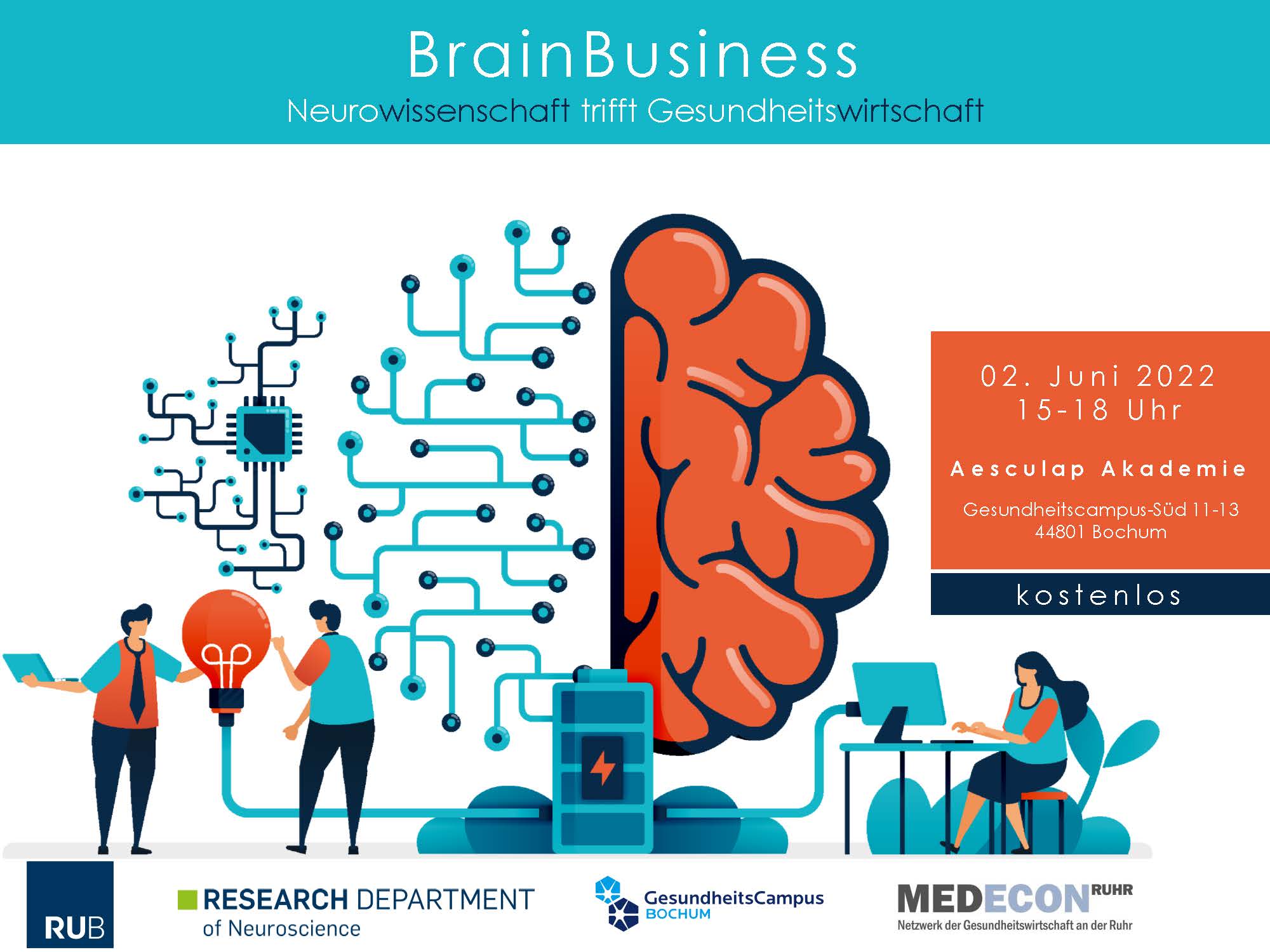02.06.2022

Opening up new transfer potentials - that is the goal of the new BrainBusiness event series, to which the Science Hub Neuroscience, together with MedEcon Ruhr and the GesundheitsCampus agency, welcomed around 60 participants from the fields of science and the healthcare industry to the Aeskulap Academy on June 2, 2022 - from young scientists and clinical partners to established companies.
Neuroscience plays a key role in innovations involving human capabilities and their interaction with new and, in particular, digital technologies. Understanding of the structure and functioning of the brain and nervous system is becoming increasingly sophisticated. Potential applications for everyday life as well as for diagnoses and therapies in healthcare are becoming increasingly clear. And this is where this event aims to come in and bring together players from the various fields.
The content of the event focused on presenting the potential of artificial intelligence in neuromedical diagnostics as well as the use of apps and virtual reality in learning-based therapy approaches.
First, Prof. Laurenz Wiskott from the Institute of Neuroinformatics introduced the basics and the current state of artificial intelligence from a neuroscientific perspective. Prof. Carsten Lukas from the Catholic Hospital Bochum (University Medicine of the RUB) gave an insight into how far AI solutions have actually been realized in radiology. Following this, Dr. Marc Kämmerer from Visus Health IT GmbH explained the need to scale AI solutions, i.e., to achieve widespread use, which he explained using, among other things, the example of the AI marketplace created at Ruhr in conjunction with the West German teleradiology association.
In the second topic area, Prof. Armin Zlomuzica (RUB Department of Behavioural and Clinical Neuroscience) started with a presentation on how fears are understood or treated and what contribution virtual reality solutions can make to this. Prof. Boris Suchan from the RUB Neuropsychological Ambulance gave an insight into the project "go4Cognition", which aims to develop and test gamification as a training approach for dementia-related cognitive impairments. Ms. Stuhlmann from icho Systems GmbH in Duisburg complemented this with experiences in the development of a smart therapy ball for people with dementia as well as people with disabilities.
The program was rounded off with lively discussions among the participants during the breaks and after the event.
A continuation of this format is being planned.
Opening up new transfer potentials - that is the goal of the new BrainBusiness event series, to which the Science Hub Neuroscience, together with MedEcon Ruhr and the GesundheitsCampus agency, welcomed around 60 participants from the fields of science and the healthcare industry to the Aeskulap Academy on June 2, 2022 - from young scientists and clinical partners to established companies.
Neuroscience plays a key role in innovations involving human capabilities and their interaction with new and, in particular, digital technologies. Understanding of the structure and functioning of the brain and nervous system is becoming increasingly sophisticated. Potential applications for everyday life as well as for diagnoses and therapies in healthcare are becoming increasingly clear. And this is where this event aims to come in and bring together players from the various fields.
The content of the event focused on presenting the potential of artificial intelligence in neuromedical diagnostics as well as the use of apps and virtual reality in learning-based therapy approaches.
First, Prof. Laurenz Wiskott from the Institute of Neuroinformatics introduced the basics and the current state of artificial intelligence from a neuroscientific perspective. Prof. Carsten Lukas from the Catholic Hospital Bochum (University Medicine of the RUB) gave an insight into how far AI solutions have actually been realized in radiology. Following this, Dr. Marc Kämmerer from Visus Health IT GmbH explained the need to scale AI solutions, i.e., to achieve widespread use, which he explained using, among other things, the example of the AI marketplace created at Ruhr in conjunction with the West German teleradiology association.
In the second topic area, Prof. Armin Zlomuzica (RUB Department of Behavioural and Clinical Neuroscience) started with a presentation on how fears are understood or treated and what contribution virtual reality solutions can make to this. Prof. Boris Suchan from the RUB Neuropsychological Ambulance gave an insight into the project "go4Cognition", which aims to develop and test gamification as a training approach for dementia-related cognitive impairments. Ms. Stuhlmann from icho Systems GmbH in Duisburg complemented this with experiences in the development of a smart therapy ball for people with dementia as well as people with disabilities.
The program was rounded off with lively discussions among the participants during the breaks and after the event.
A continuation of this format is being planned.